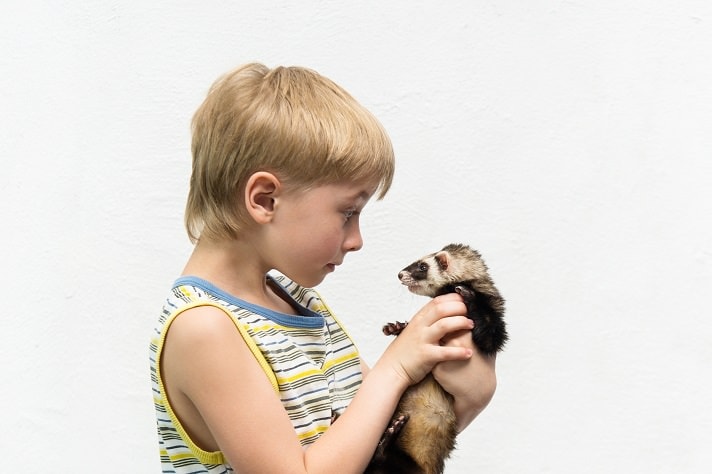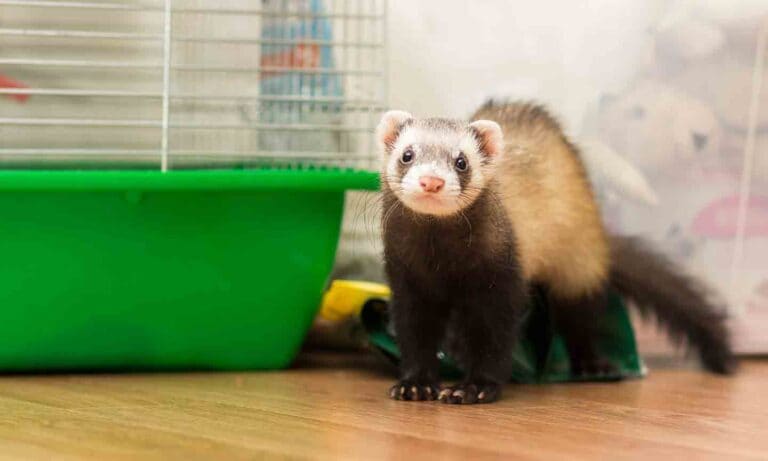Ferrets are a unique pet and fall in an area between Pocket Pets, like hamsters and mice, and full-sized companion animals, such as dogs and cats. Because of their size, many people underestimate potential challenges with ferrets. It’s not that ferrets should never be in the same house with young children, but many things must be considered if you have children and are planning to add a ferret to your household. The same holds true if you have a ferret and learn that you are expecting. Many of these aspects are true of other pets, too, and talking to a local veterinarian or pet expert about any pet you want to get is advisable before bringing home any animal.
Consider these five things before bringing a ferret into your home if you have young children or have a child on the way:
1. Ferrets are cute and fun to watch.
They have soft fur and some like to be held when it suits them. But ferrets are also mischievous and may nip in play until trained not to do so. Babies and toddlers are close to the ground, so they can be nipped or bitten if the ferret gets too close to their hands or face. The ferret may not intend to be mean; this is the way that ferrets play with each other.
2. Ferrets need playtime out of their cage and must be supervised at all times if young children are present.
Keep your ferret in a separate, ferret-proofed room with ferret supplies, away from infants and very young children. A distraction, such as a phone call or someone at the door, can prove disastrous to the child or the ferret. Ferrets have bitten babies and children have injured and killed ferrets. No one wins if the parent isn’t keeping an eye on things.
3. Ferrets are small so they don’t take up a lot of space.
However, because of their size they are also prone to getting into places where inexperienced owners least expect them to be. This means that even if you think your child is out of reach, it might not be.
Ferrets have flexible skeletons and can crawl under closed doors if there’s space; climb up screens, furniture and drapes; and jump up and pull themselves over barriers that aren’t high enough. (Some can jump up to 30 inches with outstretched legs!) And just because a ferret didn’t do it yesterday doesn’t mean that it won’t try doing it tomorrow.
Ferrets are also clever and can learn to utilize tools to some extent to get what they want. Ferrets have been known to pile things up against a barrier to get over it. I know of one ferret that learned to rock on a rocking chair until it got enough momentum to fling itself over a barrier. Sometimes ferrets are just too smart for their own good. And young children don’t have the skills to supervise ferrets, just as they can’t supervise other young children.
4. Some ferrets are hyper sensitive to high-pitched noises.
A ferret that is normally sweet and playful can go into an attack mode when it hears certain noises. A squeaky toy or even a baby’s cry can trigger this reaction. If you already have a ferret or have one lined up for purchase or adoption, take a squeaky toy and squeak it near the ferret to see how it reacts. If it lunges at the toy, then you know you will probably have a problem with a baby in the house. If the ferret doesn’t lunge but shows a keen interest or acts excited, you still may be in for trouble. No matter how much you think you want that ferret, hold off getting it. There will always be more when your child is old enough to appreciate one.
If you already have the ferret and are expecting a baby, do everything in your power to make your home ferret-safe so the ferret cannot get near the baby or the baby near the ferret. Have a new home lined up for your ferret, if possible, so if the ferret is too agitated by the baby’s cries, you have someplace to take the ferret, if needed. Hopefully a friend or relative can take your ferret for you so you can still go visit it. It’s not fair to the ferret, but if the crying agitates your pet, then your ferret is not happy either.
5. Another reason to keep your baby away from a ferret is the germ factor.
Ferrets are actually less germy than dogs and cats, but because you generally have to have several litter boxes around the house for a ferret, a toddler is more likely to end up playing in the litter boxes. Ferrets are also very prone to chewing on soft rubber or plastic items, so toys for your baby also have to be safe for your ferret.
What it all boils down to is parent/owner responsibility. Take the time to research what it takes to own a ferret and ferret-proof your home and make it ferret-safe. When you think your home is ferret-proof and ferret-safe, check it again. Talk to experienced ferret people. The safety of your child and of your pet is at stake. No one wants to experience a tragic accident with either of them.
Mary Van Dahm is the former director of F.A.I.R., the Ferret Adoption, Information and Rescue Shelter. She currently shares her home with several four-footed friends and her husband, Kurt.
By: Mary Van Dahm
Featured Image: Via RazoomGames/iStock/Thinkstock
Share:










